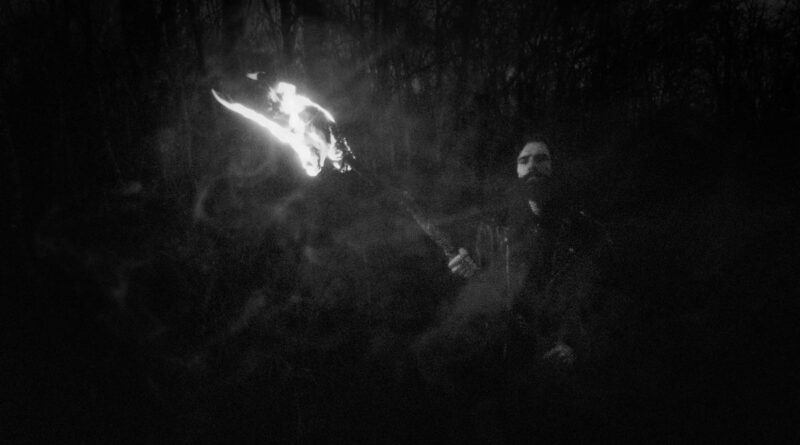Fuath: …And the Forests Dream Eternally
Andy Marshall is a living legend in Scottish extreme metal. Over the last decade he has led his Scottish folk/black metal hybrid band SAOR to the very top of the European scene, often performing more in Europe and Russia than here in the UK. It’s become impossible to discuss the UK black metal scene without mentioning SAOR – and in Scotland they reign supreme. But this isn’t about the Caledonian metal trailblazers. We’re here to delve into something far darker. Marshall formed FUATH in 2015, releasing the fantastic – if under-appreciated – debut I the following year; and that was that for the project. It was a one time thing, a foray into traditional black metal that Marshall got out of his system. Until now. Half a decade on from the release of I, FUATH is experiencing a second coming, bringing II to the masses after five long, hard years of dormancy.
“It’s the old debate with SAOR. A lot of people like to class SAOR as atmospheric black metal and I just totally disagree with that. I think it’s more based around folk and Celtic music with a bit of a black metal influence. When I was writing Guardians I wanted to write with more of a folk metal influence rather than black metal, and I ended up a few riffs and melodies that didn’t fit, so I kept them to the side. They ended up being in the first FUATH album.” Marshall begins, taking FUATH‘s story right back to the beginning. “I just thought of FUATH as a side project, I didn’t really take it as seriously as SAOR; I recorded the album with a pal and I wasn’t too fussed on the sound of the record, I just wanted it out to see what people thought.”
The response was overwhelmingly positive. The production job was raw to the extreme, but there was an abundance of character throughout FUATH‘s debut, and underneath the rough around the edges production the quality of Marshall‘s song writing shone through. There was certainly enough demand for this more puritan black metal style from Marshall, so the question begs itself: why has it taken so long to bring a follow-up to the table?
“I’m not going to lie, I kind of forgot about FUATH for a while.” He admits with a laugh. “I was writing demos for SAOR and got that feeling again. I had writer’s block while doing the SAOR demos so I started just writing some old-school black metal, as I was listening to a lot of DARKTHRONE and MAYHEM at the time. All of a sudden I had a full album’s worth of material and thought to myself ‘Well, fuck, I better do a new FUATH album then!'”
The reincarnation of FUATH is going to have a profound impact on SAOR, as well. Marshall has made no bones about his stance on SAOR as a black metal band – with FUATH offering a more traditional black metal sound, could this mean SAOR loses much of the blackened influences? “The new SAOR stuff sounds a lot more folky, and a lot more pagan metal. I can get my black metal influences out with FUATH being a serious band rather than a side project. It’s good to have another outlet. People often ask why I don’t just release my FUATH material as SAOR, but I’ve got a very specific idea of where I want to take SAOR, and I have a very specific direction I want FUATH to go in. It’s good to have the two separate outlets.”
The influence of traditional black metal across II is evident, and not just on a musical level. Marshall may not be decked out in corpse-paint and plastic armour, but there is a very pure black metal attitude to his newest album. In a very GORGOROTH move, he has chosen to keep the lyrics of FUATH‘s newest offering unpublished. Buried within the maelstroms of tremolo riffs and blast beats, what is he hiding? Deeply personal purges of his soul? Something darker?
“They’re shite!” Marshall laughs when asked about the privacy of II‘s lyrics. “Nah, I’m only joking. Basically, I wanted to capture the mystery of ’90s black metal but most people who know FUATH know who I am through SAOR. There’s no mystery in black metal any more with the internet, but the lyrics are one thing I can keep mysterious.”
There’s no hesitation in shining a light on the themes he tackles, though. And, perhaps unsurprisingly given the old-school nature of FUATH, Marshall‘s poetry tackles very familiar topics in black metal. “The lyrical difference between FUATH and SAOR is SAOR is based on Scotland and Scottish history, whereas with FUATH I wanted to write about winter and the darker themes in nature. There’s a bit of paganism in there as well.”
Things are getting very exciting for fans of Marshall‘s work. With FUATH arisen from forgotten plains and new SAOR material on its way by the end of the year, there’s no slowing down for the king of Scottish extreme metal. But while things are getting more exciting than ever at FUATH/SAOR HQ, II offers something special for listeners. A chance to escape the bombardment of COVID news, the constant hum of society, and enjoy solitude. This was an album made for walks in the woods, solitude with ones thoughts in the snow and the wind and the rain, surrounded by ancient trees while the forests dream eternally.
II is out now via Season of Mist Underground Activists.
Like FUATH on Facebook.

